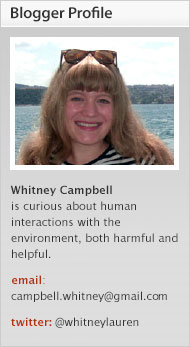« Prev Next »

According to the Agence France-Presse (AFP), who obtained an advanced draft of the Kampala meeting's "20-page Summary for Policymakers," the situation is still dire.2 The IPCC's working groups seem to have concluded, for instance, that recent extreme weather patterns conform to global warming predications with increased land temperatures, higher atmospheric humidity levels, and warmer ocean surfaces. The nine-chapter report, to be entitled the "Special Report on Managing the Risks of Extreme Events and Disasters to Advance Climate Change Adaption," will also argue that the likelihood of record hot-days globally increasing is "virtually certain" (99-100% sure), with similar predictions of extreme weather of all manner, including heavy rains, snowfalls, and acute droughts.
While I'm not exactly sure what evidence the assessment will consider, it does seem to me that there's been a lot of extreme weather lately, with flooding this past year occurring in Thailand, El Salvador, Nicaragua, Pakistan, India, and parts of the US while droughts are happening concurrently in Northeast Africa, China, and other US states, including Texas, where I grew up. In addition to these examples, the report could also mention recent research showing a relation between shrinking animal body size and increasing temperatures,3 or even reference the risks of conflict and poor public health that climate change seems to bring.4 As the IPCC doesn't produce primary research, but rather surveys peer-reviewed data, there really are countless studies it could cover.
Its 2007 assessment cited thousands of references, though despite this mass of data, there still are some unconvinced of the report's findings and of climate change in general. According to a recent book by Canadian journalist Donna Laframboise, the contributions of graduate students are one of the many weaknesses of the 2007 IPCC report.5 In a FOX News article, Laframboise states that "We've been told that [the IPCC] is a responsible business man in a three-piece suit, but it turns out it's a sloppily dressed teenager — a spoiled brat that can't be trusted."6 In a separate opinion piece, she also criticizes the fact that "a woman 16 years away from completing her doctorate... was one of only 21 people in the entire world selected by the IPCC to write about climate change and human health."7
As a grad student myself, I found these criticisms slightly unwarranted, and I don't seem to be alone, with recent reviews of Laframboise's book indicating discrepancies of a different order. One of the grad students, for example, mentioned in the book as "earning his master's [of public health] only two years earlier," evidently already had a MD in occupational/environmental and family medicine.8 Furthermore Laframboise's criticisms of the panel's efforts to establish "diversity," "gender balance," and proportionate "regional representation" also seem problematic,9 with her comparison between Greenpeace members and vampires being, for me, mostly puzzling.10
In response to these claims, while I don't want to fault Lamframboise for the same reasons she discredits the IPCC authors, I do have to wonder, as her most advanced degree is a BA, by her own criteria wouldn't she have to regard the material in her own book as suspect because of her own educational achievements? I realize that I'm unqualified to pass judgment on the educational credentials of both Laframboise and the authors of the IPCC assessments — I will also gladly admit that I'm not an expert on global warming. But as a reader and stakeholder in the environment, I do feel I'm able to discuss the rhetoric of this debate, as much as any other media consumer.
So when I stumbled upon a recent article in the news blog section of the UK's The Telegraph that cited Laframboise's book and called green charities "evil and dangerous" — in the headline — I started questioning the inflammatory tone's impact on public dialogue.11 While I emphatically support scrutinizing scientific findings, when these critiques contain terms such as "evil," "delinquent," and "vampire," I begin to wonder if pertinent information is being obscured, and how people are meant to make sense of it. As sociologist of science Bruno Latour put it last year, "Lost in the problem [of climate change], the public is now also lost in the media addressing the problem."12 Just like the heat waves that can distort warm highways, it seems that this scorching rhetoric only makes it harder to distinguish what is being warped from what actually lies ahead.
Image credit: Photo of thin ice off of Antartica's Pine Island Glacier was taken by Jim Yunger with NASA.
1. Kelly, S. & O'Driscoll, P. "Report Says Global Warming Very Likely Man-made, to Continue 'for Centuries.'" USA Today. March 1, 2007.
2. Hood, M. "Key UN Report Ties Climate Change to Extreme Weather." Agence France-Presse. November 1, 2011.
3. Sheridan, J. & Bickford, D. (2011). Shrinking body size as an ecological response to climate change. Nature Climate Change, 1, 401-406 DOI: 10.1038/nclimate1259 ResearchBlogging.com
4. Barnett, J. & Adger, W. (2007). Climate change, human security and violent conflict. Political Geography, 26, 639-655 DOI: 10.1016/j.polgeo.2007.03.003 ResearchBlogging.com
5. Laframboise, D. The Delinquent Teenager Who Was Mistaken for the World's Top Climate Expert. Toronto: Ivy Avenue Press, 2011.
6. Chiramonte, P. "U.N. Hires Grad Students to Author Key Climate Report." FOX News. November, 2, 2001.
7. Laframbroise, D. "Almost Nothing We've Been Told About the IPCC Is Actually True." FOX News. November 7, 2011.
8. Fong, J. & Theel, S. "Fox Scraping the Barrel for Attacks on UN Climate Panel." Media Matters. November 3, 2011.
9. Laframboise, D., The Delinquent Teenager..., 9.
10. Ibid., 11.
11. Delingpole, J. "Green Charities: Way More Evil and Dangerous than Exxon or the Koch Brothers." The Telegraph. November 10, 2011.
12. Latour, B. "The Year in Climate Controversy." Artforum. December 2010.






















